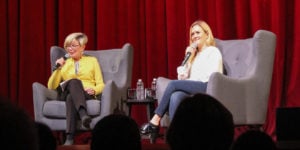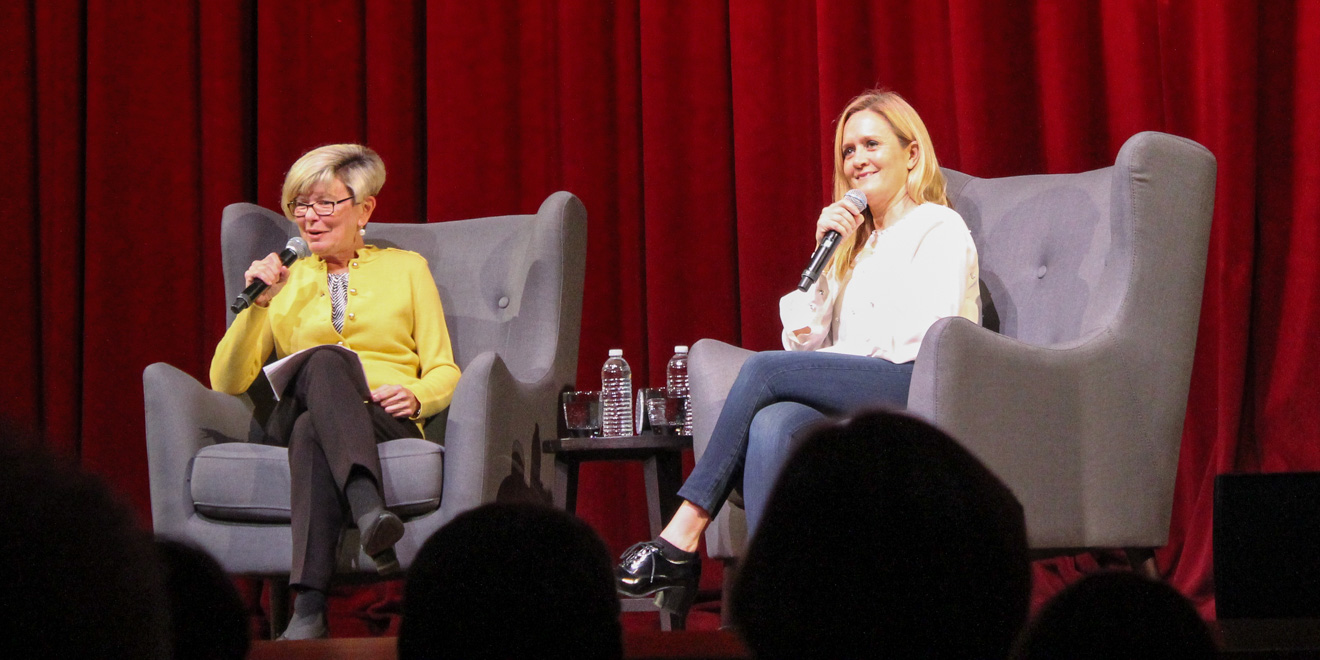Comedian, political commentator and television host Samantha Bee addressed gender equity in the workplace, hiring diversity and sexual harassment in an on-campus talk last Friday. Hosted by Stanford Live, Bee spoke in conversation with Stanford sociology professor and Clayman Institute of Gender research director Shelley Correl.

Bee joined Comedy Central’s “The Daily Show with Jon Stewart” as the sole woman correspondent in 2003. When she left “The Daily Show” in 2015, Bee was the program’s longest-serving correspondent. She then launched “Full Frontal with Samantha Bee,” the first late-night talk show with a female host, in February 2016.
On sexual harassment in the workplace and otherwise, Bee expressed her support for the #MeToo campaign.
“It’s essential to remove shame [of sexual harassment or assault] from the equation,” she said. “As soon as you start talking about something, the stories start pouring out. It’s a shared experience.”
Bee noted that she has increasingly covered issues related to sexual harassment on her show. When asked whether apologies were a sufficient response from sexual harassers, Bee made clear that there is more they can do.
“Of course, [that is] a starting place to owning your behavior,” said Bee. “But there were opportunities that were lost for people, who lost faith in the industry and what art we lost because people were discouraged from pursuing their dream.”
“But the question is: What is the next step?” added Bee. “How do you repay people for the things that you took from them, that squashed them? And I don’t know what the answer is to that.”
Bee also emphasized the importance of building a diverse cohort for her late-night satire show.
“We think about whether this person will bring a fresh, new perspective,” she said. “Most people [who] are very experienced in writing and producing are white guys that have a ton of experience. At that point, you have to do your own research.”
Bee said that social media is a crucial tool for her and her team as they seek to hire more writers for “Full Frontal,” as it affords her access to a wider swath of candidates with different backgrounds and styles. Social media content from potential hires, Bee said, also allows her to gauge their sense of humor.
Finally, Bee offered advice for young women striving to enter professional arenas dominated by men.
“You have to make your own opportunities,” she said. “You have to explore ideas adjacent to things that you thought that you wanted. Be busy, be nimble. It can take you on a very true and great journey if you stay true [to] the thing that you started off liking, as I did.”
Q&A
The Stanford Daily (TSD): In an industry that’s mostly male-dominated, what’s it like being a female late-night show host?
Samantha Bee (SB): I love it. Of course, I’m welcoming and always wishing there were more women in that space. I think that others will join, but it’s a good place for me to be. I mean we’re very much our own island. There’s no interplay between the shows, so we all exist in our own space just doing our own thing, and it’s a great place to be. I sort of ignore what everyone else is doing, and I do my own thing.
TSD: How can you encourage more women to enter the late-night show business?
SB: I hire a lot of women at my office who will one day go off and have their own shows. That’s my hope for them; I’m sure that’s their ambition. I don’t think they’re even shy about that. I always kinda hoped that [“Full Frontal”] would be a launch pad for people to go to create their own thing. I think that’s really important because that’s what “The Daily Show” was for me. It was a training ground for me. It’s helpful to learn how television is made.
TSD: You have one of the most diverse staff [in the industry].
SB: That’s the goal. I mean we try, we definitely try.
TSD: Why is diversity important to you, and do you think that affects the way the show is made?
SB: I do; I think it really affects the way the show is made but not in a way we’re very self-conscious about. It’s not like we sit around and high-five each other every five seconds. I think it just, in a very natural and organic way, makes the show better and more representative of different points of view. People bring stories based on their interests. A big part of why the show works and what makes it great to work there is that people … bring their honest and true — they bring their own interests. So the greater the diversity of the show, the greater the diversity of the stories we can cover. And it really is very helpful in a very fluid way.
TSD: How do you sort through all the soundbites that come in? What’s the process like?
SB: We have an entire department devoted entirely to research. They’re all journalists — when Al Jazeera in America closed, we basically took everyone there [laughs]. We didn’t take their whole staff but we definitely took a bunch of amazing people, and they sort through everything. They pitch amazing stories and they create these research transcripts full of soundbites and written research. And that transcript is what the writers work off of. [The research department] really curates the research on a given subject, and of course, they’re very scrupulous about fact checking as well.
TSD: Where do you come into the process?
SB: I’m there the whole time. The show is very collaborative — I have ideas for things, other people have ideas. Everything of course comes through me but in a very, really imaginative and collaborative way. So everyone brings stories to the show, and we choose the ones that mean the most to all of us.
TSD: What was the most difficult “Full Frontal” show that you’ve done?
SB: Without a doubt, it was the day after the election. Without a shadow of a doubt.
TSD: And why the day after the election?
SB: Well, we were devastated. We had a very celebratory show planned. There was nowhere in our imagination that Donald Trump would win the election. We had a balloon drop planned. I had a sparkly outfit. We had a musical guest that would sing a celebratory song. We just wanted to drink in the fact that we would have a woman president. We were so excited. So when he won, not only did the world change; the entire show, we had to shift, re-edit all the field pieces we had done. Everyone was devastated. I mean listen, I have one staff member whose whole family lives in Iran, and she was like, “Am I going to see my family again?” It was tough. We really came together to pull [the show] off, and I really think we nailed it, but it was really tough.
TSD: Are there things you practice in your daily life to break open the bubble or echo chamber and hear from both sides?
SB: I never ever believe in everything I read. I mean, there are credible sources out there, but I bounce around a lot. You have to bounce around. You have to know where the story comes from; especially if you’re reading it from a source that aggregates content, you have to look to where it really originated, and if you can’t figure out [the origin], you should suspect it. We are very diligent with the source material we use on the show. If everybody practiced that due diligence on a smallest level, we’d probably be in a better place. It’s really hard to do though. It’s time-consuming.
TSD: In five years from now, where do you see yourself and the show?
SB: That’s interesting. I don’t think in five-year chunks; I think in two-year chunks. I don’t know why. In two years, I’d still be doing the show, and hopefully for the next election, we’ll be hopeful. That’s my prayer, my meditation.
Contact Tara Shelby and Aparna Verma at tshelby ‘at’ stanford.edu and averma2 ‘at’ stanford.edu.
